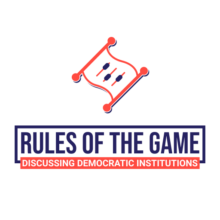Show notes of the trailer
Transcript of the Trailer:
Hello and welcome to the the Rules of the Game Podcast, where it is my job to discuss democratic institutions.
I am your host, Stephan Kyburz, and I am super excited to introduce to you this new Podcast. I am a political economist with a PhD in Economics from the University of Bern in Switzerland. And I previously held positions at the London School of Economics and Political Science and the Center for Global Development. My research interests are in economic development, conflict studies, and political economy. Yet, I have decided to dedicate more time towards the public discussion of democratic institutions. I strongly believe in the wisdom of the people and the power of knowledge. People should be more aware of the political institutions that govern their lives.
Institutions are the rules of the game of our societies that direct our everyday lives more than we can possibly imagine. They are the constraints that shape human interaction and behavior. They determine whether we live in a free or repressed society.
But who designs our rules of the game?
Who has the power to change the rules of the game? To change or amend the constitution?
Who shapes and develops our political institutions?
These are important questions, but they are little discussed publicly. It is the goal of this podcast to shed more light on the fundamental rules in our societies, raise awareness about them, and make knowledge on democratic institutions more widely available.
Why are some countries poor and others rich? And what does it have to do with the rules of the game?
What do the American, the Brazilian, the Nigerian and the Swiss constitutions have in common? Where do they differ? What can we learn from comparing their changes over time?
Why do most European democracies elect their parliaments through a system of proportional representation while the US and the UK use a first-past-the-post system? How do electoral laws affect representation in parliaments and how does this affect legislation and redistribution?
How do we constrain our executive governments and divide or decentralize power? What are the main differences between presidential and parliamentary systems of government?
Is the parliament or the population sovereign and do the citizens have veto power in legislation? What are the advantages and risks of direct democracy? What are the principles that should be respected to make direct democracy work?
These are just some of the questions that I will attempt to answer together with guests from around the world. People who are at the forefront of building democracies. People who are dedicated to improve and fight for democracy.
Many established and emerging democracies are under threat by authoritarian forces. There are huge challenges ahead like rapid technological development, rising inequality, global governance, and climate change.
Many people feel that democracy has not served them well. People around the world feel neglected by their governments. People doubt whether democracy is the supreme form of government, observing Countries like China, Vietnam or Singapore experiencing high economic growth rates and seeming stability.
I perceive the main social struggle not as capitalism versus socialism. To me, the core social struggle is for fair representation, government accountability, direct democratic participation, and the ultimate sovereignty of the people. It’s about whether and how political power is divided and shared. This depends on how well our democracies are developed and who can set the rules of the game – is it an autocratic dictator, an oligarchic wealthy corporate elite, or a democratic people? Is power concentrated in a unitary centralized state or shared among federal or decentralized units?
I am convinced that the best days of democracy around the world are still ahead. But we need to work for it. There are many shades of democracy, it is not a zero sum game. It’s not a black or white issue. The main question is how we establish our democracies, how we design our constitutions. Citizens need to know about the rules of the game and take part in the discussion.
The question is how we can create rules that allow everyone to thrive.
So if you agree that these questions are interesting and important, you may want to subscribe to this podcast. Or if you feel that democracy hasn’t been serving you well; If you perceive your political system as corrupt or rigged, or if you want to have a better understanding of the rules of the game , then I hope this podcast can offer some interesting discussions and answers.
If you’d like to join me on this journey, please subscribe on any podcast plattforms and enjoy the upcoming episodes. Thanks for tuning in. Please also check out the Rules of the Game podcast website at “rulesofthegame.blog”
